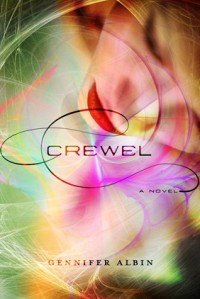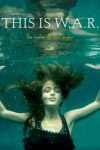11
Followers
30
Following
Tonina Talks Tales
Lifelong reader with the food-smudged and bath-drowned books to prove it. I read YA and SF/F with forays into history, politics, classic lit, and *good* historical fiction. My e-reader is my constant companion.
Crewel (Crewel World, #1)
 Crewel reminds me of one of my early experiments in cooking - a mix of many different good ingredients that ultimately did not combine well.Gennifer Albin has on the surface created a unique world - one in which the only unmarried women of the society are the Spinsters. These women use looms to weave the threads of this reality and thereby create and maintain every feature of said society, every so cutely named Arras (as in, the assassin hiding behind the arras), under the minute control of male politicians. They have power over everything: they can change or create new geographic features, direct the weather on a minute-to-minute basis, and even rip "threads" (read: people) out of the tapestry, thereby supposedly killing them. Herein lies a giant plot hole: if the Spinsters literally have control over every aspect of this reality, including people's existence, why haven't they revolted and taken over? The author works to resolve this with the common dystopian trope of women being stuck in subservient roles (in this case, forced to marry by 18 and work as teachers, nurses, secretaries, stewardesses, etc.), but to me the scenario didn't really make sense for this book. With so much power, it makes no sense that the Spinsters would remain subservient. I can certainly understand why men would want to push women into lower-caste roles - fear of power leads many groups of people to do all sorts of awful things - but without more information, this doesn't hold water for me.At any rate, our heroine, Adelice, is chosen to become a Spinster because she has a pronounced ability to weave the threads of Arras - and ability her parents have tried to hide. Good little Adelice, who has never questioned her parents' understated resistance to typical Arras social values nor resisted their attempts to train her into an appearance of clumsiness, rather jarringly becomes rebellious Adelice. She quickly makes enemies out of nearly every powerful figure she encounters, from a fellow talented new Spinster to a top male political figure. She also attracts two love interests - Erik, who is the (underdeveloped and largely uninteresting) boy toy of a cartoonishly mean villainess, and Jost, whom she first hates and then quickly loves, in true current YA fashion. Yes, it's the dreaded love triangle - only it's the kind of love triangle in which you can tell very quickly which two of the three points are going to get together but the author still tries to keep up the romantic "tension".Eventually Adelice discovers she's a special snowflake among special snowflakes, in that she has the power to weave the threads of Arras without using a loom. She ends up apprenticed to the Creweler (the only other person in Arras who can do such a thing), a position of great power, though still supposedly subservient to men. Varying twists and turns ensue, and by the end, Adelice discovers a long-hidden secret about Arras and leaves us at a breathless cliffhanger ending, two love interests at her sides.There were aspects of Crewel I genuinely liked, but a lot of it left me feeling confused, irritated, or both. The weaving and the mutable-reality aspects of the story were interesting (though the former reminded me of the Fionavar Tapestry trilogy in some ways), but I found the world-building somewhat lacking. There was an explanation of Arras' history (which I won't mention, for fear of being too spoilery), but it was limited and didn't really explain how women came to be subjugated nonentities. The conflict between the idea that women held such enormous power over Arras reality and the notion that they held no power within their society bothered me quite a bit. And while I liked the development of one of the love interests, Jost, the other one remained flat as a handsome paper doll to me. Overall, I'm giving Crewel the benefit of the doubt and rating it three stars. There's the potential for the story to become more coherent and the world-building more clear in future installments. I'm interested to see where the author goes from the cliffhanger (though I hope she won't take the typical post-apocalyptic route) and what she does with the situations Jost faces at the end of the book. There were just enough original elements and interesting touches to make the series worth following into the future.
Crewel reminds me of one of my early experiments in cooking - a mix of many different good ingredients that ultimately did not combine well.Gennifer Albin has on the surface created a unique world - one in which the only unmarried women of the society are the Spinsters. These women use looms to weave the threads of this reality and thereby create and maintain every feature of said society, every so cutely named Arras (as in, the assassin hiding behind the arras), under the minute control of male politicians. They have power over everything: they can change or create new geographic features, direct the weather on a minute-to-minute basis, and even rip "threads" (read: people) out of the tapestry, thereby supposedly killing them. Herein lies a giant plot hole: if the Spinsters literally have control over every aspect of this reality, including people's existence, why haven't they revolted and taken over? The author works to resolve this with the common dystopian trope of women being stuck in subservient roles (in this case, forced to marry by 18 and work as teachers, nurses, secretaries, stewardesses, etc.), but to me the scenario didn't really make sense for this book. With so much power, it makes no sense that the Spinsters would remain subservient. I can certainly understand why men would want to push women into lower-caste roles - fear of power leads many groups of people to do all sorts of awful things - but without more information, this doesn't hold water for me.At any rate, our heroine, Adelice, is chosen to become a Spinster because she has a pronounced ability to weave the threads of Arras - and ability her parents have tried to hide. Good little Adelice, who has never questioned her parents' understated resistance to typical Arras social values nor resisted their attempts to train her into an appearance of clumsiness, rather jarringly becomes rebellious Adelice. She quickly makes enemies out of nearly every powerful figure she encounters, from a fellow talented new Spinster to a top male political figure. She also attracts two love interests - Erik, who is the (underdeveloped and largely uninteresting) boy toy of a cartoonishly mean villainess, and Jost, whom she first hates and then quickly loves, in true current YA fashion. Yes, it's the dreaded love triangle - only it's the kind of love triangle in which you can tell very quickly which two of the three points are going to get together but the author still tries to keep up the romantic "tension".Eventually Adelice discovers she's a special snowflake among special snowflakes, in that she has the power to weave the threads of Arras without using a loom. She ends up apprenticed to the Creweler (the only other person in Arras who can do such a thing), a position of great power, though still supposedly subservient to men. Varying twists and turns ensue, and by the end, Adelice discovers a long-hidden secret about Arras and leaves us at a breathless cliffhanger ending, two love interests at her sides.There were aspects of Crewel I genuinely liked, but a lot of it left me feeling confused, irritated, or both. The weaving and the mutable-reality aspects of the story were interesting (though the former reminded me of the Fionavar Tapestry trilogy in some ways), but I found the world-building somewhat lacking. There was an explanation of Arras' history (which I won't mention, for fear of being too spoilery), but it was limited and didn't really explain how women came to be subjugated nonentities. The conflict between the idea that women held such enormous power over Arras reality and the notion that they held no power within their society bothered me quite a bit. And while I liked the development of one of the love interests, Jost, the other one remained flat as a handsome paper doll to me. Overall, I'm giving Crewel the benefit of the doubt and rating it three stars. There's the potential for the story to become more coherent and the world-building more clear in future installments. I'm interested to see where the author goes from the cliffhanger (though I hope she won't take the typical post-apocalyptic route) and what she does with the situations Jost faces at the end of the book. There were just enough original elements and interesting touches to make the series worth following into the future.



